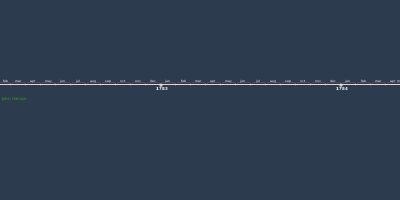James Buchanan (4 marzo 1857 anni – 4 marzo 1861 anni)
Descrizione:
(1791-1868)VP: John C. Breckinridge
Buchanan sought to be the clear leader of the cabinet, and chose men who would agree with his views. Concentrating on foreign policy, he appointed the aging Lewis Cass as Secretary of State. Buchanan's appointment of southerners and southern sympathizers alienated many in the north, and his failure to appoint any followers of Stephen Douglas divided the party.[33] Outside of the cabinet, Buchanan left in place many of Pierce's appointments, but removed a disproportionate number of northerners who had ties to Pierce or Douglas. He quickly alienated his vice president, Breckinridge, and the latter played little role in the Buchanan administration.
Though Buchanan predicted that "history would vindicate my memory," historians have criticized Buchanan for his unwillingness or inability to act in the face of secession. Historical rankings of United States Presidents consistently place Buchanan among the least successful presidents. When scholars are surveyed, he ranks at or near the bottom in terms of vision/agenda-setting, domestic leadership, foreign policy leadership, moral authority, and positive historical significance of their legacy. In several of these polls (taken prior to 2014), Buchanan is ranked as the worst president in U.S. history.
Buchanan biographer Philip Klein explains the challenges Buchanan faced:
Buchanan assumed leadership ... when an unprecedented wave of angry passion was sweeping over the nation. That he held the hostile sections in check during these revolutionary times was in itself a remarkable achievement. His weaknesses in the stormy years of his presidency were magnified by enraged partisans of the North and South. His many talents, which in a quieter era might have gained for him a place among the great presidents, were quickly overshadowed by the cataclysmic events of civil war and by the towering Abraham Lincoln.
Biographer Jean Baker is less charitable to Buchanan, saying in 2004:
Americans have conveniently misled themselves about the presidency of James Buchanan, preferring to classify him as indecisive and inactive ... In fact, Buchanan's failing during the crisis over the Union was not inactivity, but rather his partiality for the South, a favoritism that bordered on disloyalty in an officer pledged to defend all the United States. He was that most dangerous of chief executives, a stubborn, mistaken ideologue whose principles held no room for compromise. His experience in government had only rendered him too self-confident to consider other views. In his betrayal of the national trust, Buchanan came closer to committing treason than any other president in American history.
Aggiunto al nastro di tempo:
Data:
4 marzo 1857 anni
4 marzo 1861 anni
~ 4 years
